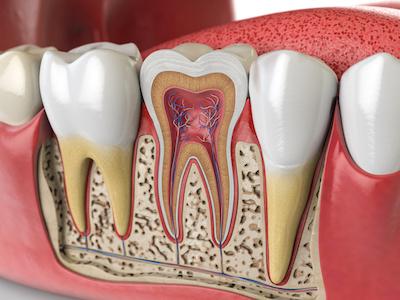Root Canal Therapy
 Root canal treatment is not the complex or scary procedure you might think. It doesn’t cause pain, it relieves it, and it is the only procedure that can save an infected tooth from extraction.
Root canal treatment is not the complex or scary procedure you might think. It doesn’t cause pain, it relieves it, and it is the only procedure that can save an infected tooth from extraction.
At Derhake Dental, our caring dental team understands that you still might be concerned if you hear you need root canal treatment. Rest assured, you couldn’t find a more compassionate group of professionals to ensure you're comfortable and have a stress-free experience.
Why Do I Need Root Canal Treatment?
We recommend a root canal because bacteria has entered the dental pulp located deep inside and caused an abscess or infection. Dental pulp contains the nerves, blood vessels, and tissue that nourish your tooth and keep it alive.
The most common symptom of a tooth infection is a throbbing toothache that continues to worsen. Our priority is to provide prompt pain relief and save your tooth, and the only way to do that is with root canal treatment.
What Are Symptoms of An Infected Tooth?
The most common symptoms of an infected tooth are:
- Excruciating tooth pain
- Swollen or inflamed gums
- Sensitivity to hot and cold
- Lingering pain when biting down or touching the tooth
- A darkened tooth
- A foul taste in your mouth
- A whitish bump or “pimple” on the gums
If you have any of these symptoms, please call us right away. A tooth infection will not go away on its own and will continue to spread. Left untreated, the infection can travel to other parts of your mouth or even to your body and become life-threatening.
What's Involved with a Root Canal?
 The goal of root canal treatment is to remove the infected tooth pulp. It is a painless procedure because we numb the tooth and ensure you’re comfortable before we begin. If you had a toothache when you arrived for treatment, numbing the tooth will relieve the pain you're experiencing.
The goal of root canal treatment is to remove the infected tooth pulp. It is a painless procedure because we numb the tooth and ensure you’re comfortable before we begin. If you had a toothache when you arrived for treatment, numbing the tooth will relieve the pain you're experiencing.
Dr. Spring accesses the inside of the tooth and carefully removes the infected tissue. Next, she disinfects the tooth and places a material called gutta-percha in the hollowed-out area to prevent reinfection. In the final steps, she seals the tooth and protects it by placing a temporary filling.
After Root Canal Treatment
In the day or two after root canal treatment, it’s common to experience some soreness in the area as the tooth heals. Taking over-the-counter pain medication like ibuprofen is usually all you need for prompt relief.
After two weeks of healing, you will return to our Florissant dental office, and Dr. Spring will fit you for a dental crown or place a final filling on the tooth.
Don’t Postpone Root Canal Treatment!
Any toothache indicates a problem and should be taken care of right away. In the case of an infected tooth, you can jeopardize your overall wellness by not calling us at the first sign of tooth pain.
If you have symptoms of an infected tooth or have a toothache and aren’t sure why, please call our Florissant, MO, dental office promptly. The sooner we see you, the sooner we can relieve your discomfort and provide treatment to protect your oral health.


